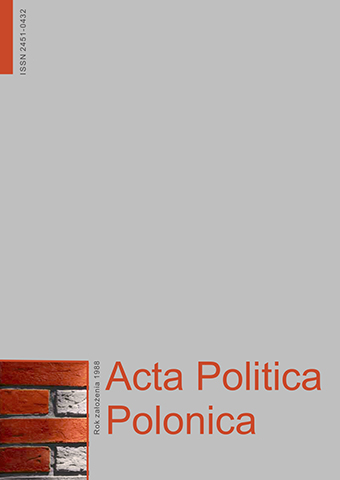
ISSN: 2451-0432
OAI
DOI: 10.18276/ap.2018.43-06




Issue archive /
1/2018 (43)
Czynniki reelekcji inkumbentów na stanowiskach gminnej egzekutywy w gminach miejskich i miejsko-wiejskich w 2014 roku
(Determinants of Re-election of Incumbents to Communal Executive Offices in Urban and Urban-Rural Communes in 2014)
| Authors: |
Sławomir
Bartnicki
Uniwersytet w Białymstoku, Instytut Socjologii i Kognitywistyki |
| Keywords: | determinants of re-election of mayors 2014 election communal executive |
| Data publikacji całości: | 2018-03-30 |
| Page range: | 14 (61-74) |
| Klasyfikacja JEL: | Z19 |
Abstract
The article presents the evaluation of selected characteristics of communes and candidates in terms of possible moderation of chances of re-election of incumbents as the managers of communal executive in urban and urban-rural communes in the 2014 election. The conclusions suggest that the chance of re-election in that election in the above-mentioned group of offices was effectively moderated i.a., by variables such as: the duration of holding the office before, having the majority in the communal council, the type of affiliation of the incumbent’s election committee, and the values of the following variables in the year of the election: the commune’s asset-related investment expenditure per capita, % of commune’s expenditure on culture, p.c. of commune’s expenditure on social welfare, as well as the number of foundations, associations and social organizations except Voluntary Fire Brigades per 10 thousand residents.
Download file
Article file
Bibliography
| 1. | Bartkowski, J. (2003). Tradycja i polityka. Wpływ tradycji kulturowych polskich regionów na współczesne zachowania społeczne i polityczne. Warszawa: Wydawnictwo Akademickie Żak. |
| 2. | Castro V., Martins R. (2011). Mayors’ Reelection Choice and the Economy. Evidence from Portugal. Braga: Núcleo de Investigação em Políticas Económicas e Empresariais. Pobrane z: http://www.nipe.eeg.uminho.pt/Uploads/WP_2011/NIPE_WP_06_2011.pdf (1.07.2016). |
| 3. | Chmielewski, T., Malinowski, K. (2004). Door-to-door jako instrument aktywizacji wyborców. W: M. Jeziński (red.), Marketing polityczny. W poszukiwaniu strategii wyborczego sukcesu (s. 261–297). Toruń: Dom Wydawniczy Duet. |
| 4. | Drazen, A. (2008). Political Budget Cycles. W: S.N. Durlauf, L.E. Blume (red.), The New Palgrave Dictionary of Economics. Basingstone–New York: Palgrave Macmillan. Pobrane z: http://www.dictionaryofeconomics.com/article?id=pde2008_P000346 (1.07.2016). |
| 5. | Fiorina, M. (1981). Retrospective Voting in American National Elections. New Haven: Yale University Press. |
| 6. | Kushner, J., Siegel D., Stanwick H. (1997). Ontario Municipal Elections: Voting Trends and Determinants of Electoral Success in a Canadian Province. Canadian Journal of Political Science, 3 (30), 539–553. D OI: 10.1017/S0008423900016000. |
| 7. | Moore, A.A., McGregor, R.M., Stephenson, L.B. (2017). Paying Attention and the Incumbency Effect. Voting Behavior in the 2014 Toronto Municipal Election. International Political Science Review, 1, 85–98. DOI: 10.1177/0192512115616268. |
| 8. | Oliver, E., Ha S.E. (2007). Vote Choice in Suburban Elections. The American Political Science Review, 3 (101), 393–408. DOI: 10.1017/S0003055407070323. |
| 9. | Oliver, E.J., Ha S.E., Callen Z. (2012). Local Elections and the Politics of Small-Scale Democracy. Princeton: Princeton University Press. |
| 10. | Peltzman, S. (1992). Voters as fiscal conservatives. Quarterly Journal of Economics, 2, 327–361. |
| 11. | Peters, G. (1995). Polityka i biurokracja państwowa. W: J. Szczupaczyński (red.), Władza i społeczeństwo. Antologia tekstów z zakresu socjologii i polityki (s. 153–172). Warszawa: Scholar. |
| 12. | Trounstine, J. (2011). Evidence of Local Incumbency Advantage. Legislative Studies Quarterly, 2 (36), 255–280. DOI: 10.1111/j.1939-9162.2011.00013.x. |
| 13. | Veiga L., Veiga F.J. (2006). Does Opportunism Pay Off? Braga: Núcleo de Investigação em Políticas Económicas e Empresariais. Pobrane z: http://ssm.com/abstract=911200, (30.12.2017). |
| 14. | Veiga, L., Veiga F. (2007). Does Opportunism Pay Off? Economics Letters, 96, 177–182. |